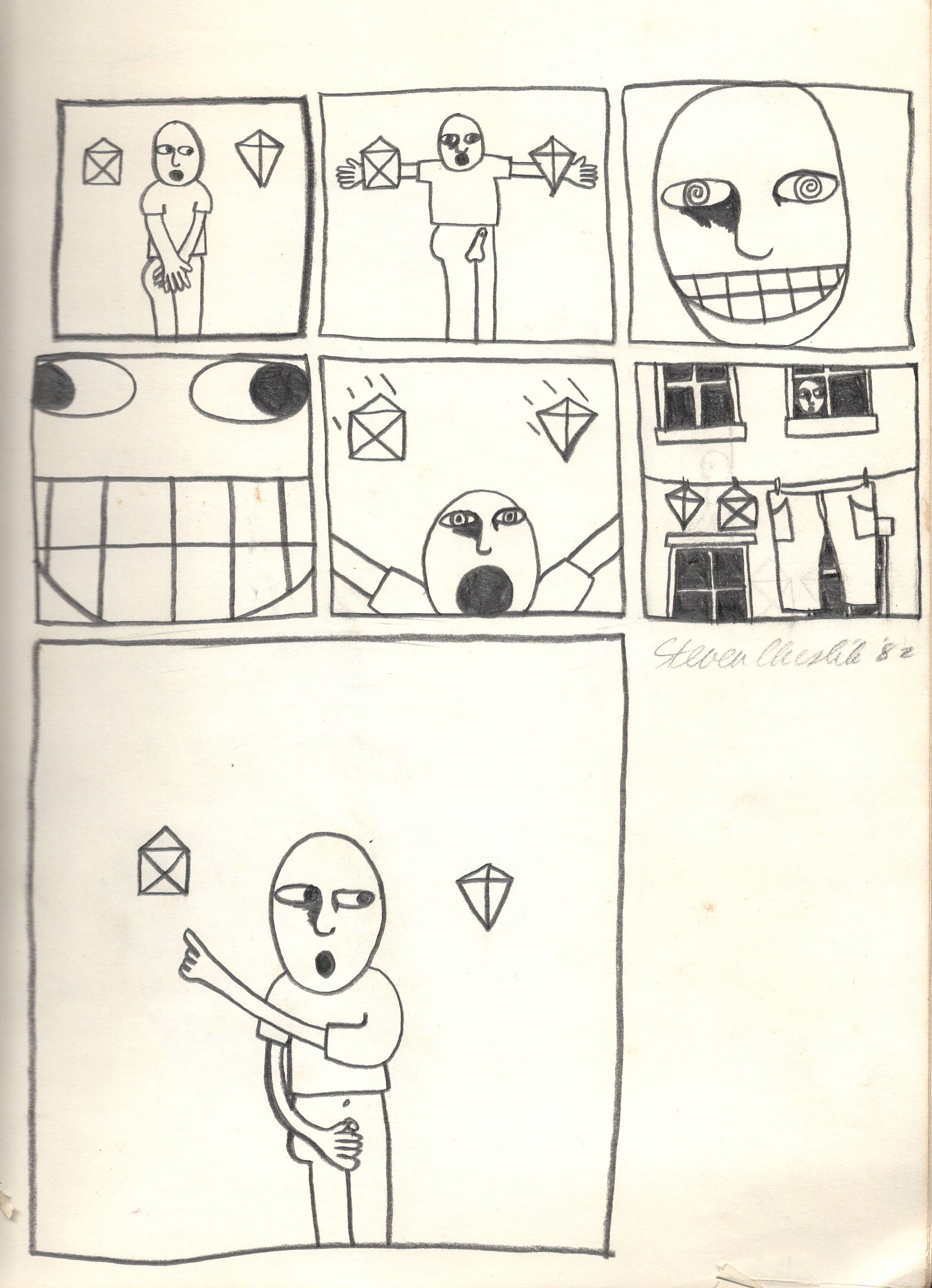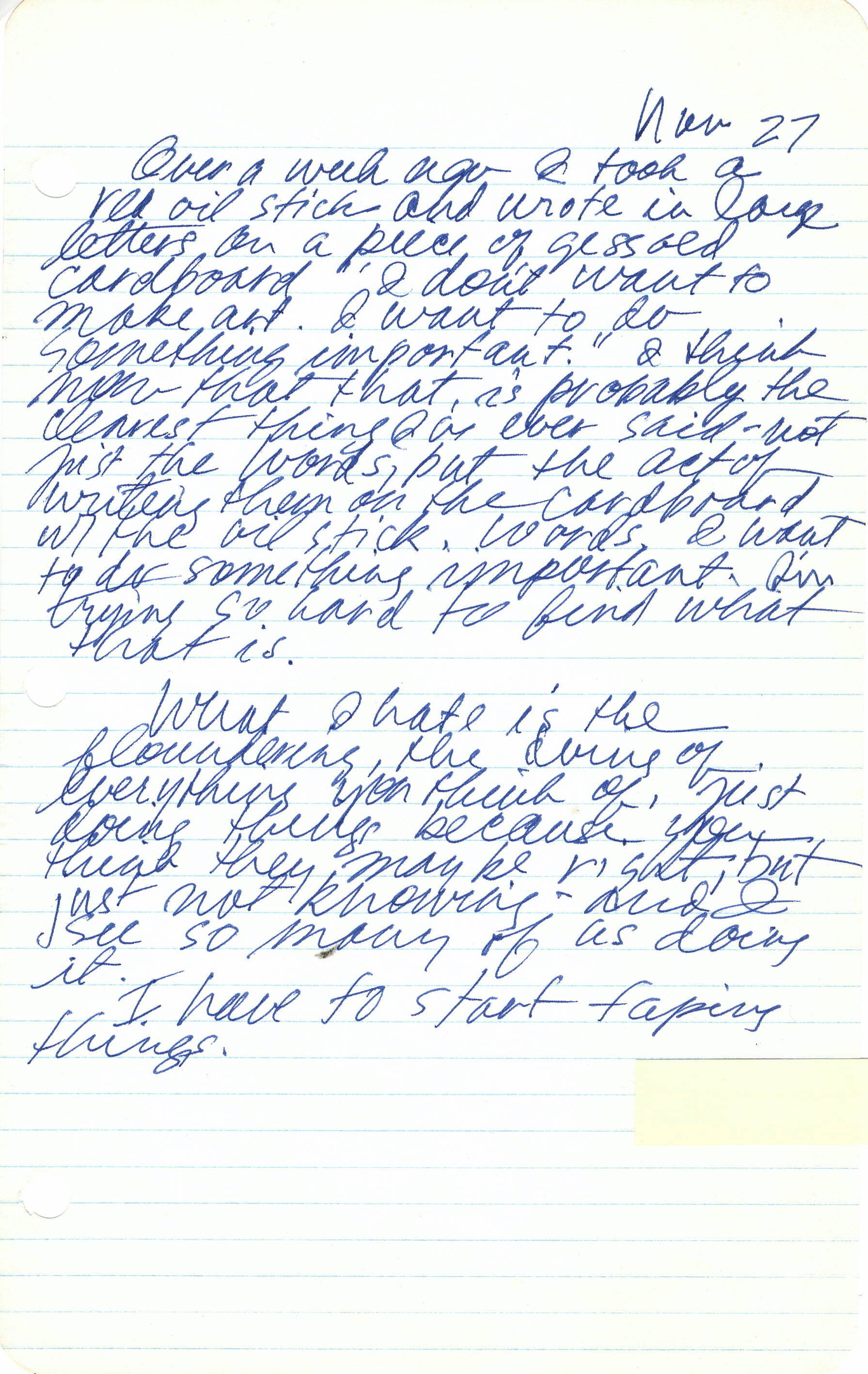I spent a few weeks researching the serial killer Larry Eyler, reading and listening to whatever I could find on the internet. Next I want to read the transcripts of his 1989 murder trial in Chicago. I have to do that in person at the courthouse, and that visit will be part of a much larger trip to Indiana and Illinois for research, interviews, etc. It might be a while before I can do that, so I’ve moved on to other tasks.
This week I am locating and compiling all my journals. All of them. My journal-keeping has been sporadic, regular and comprehensive for certain periods of time and then nothing for long stretches. But I started at 15 and I’m nearly 60, so even sporadic adds up to a lot. The old ones are on paper, many of the newer ones are digital. For many years I’ve been frustrated that a few months worth of entries from 2000-2001 are in WordPerfect files, too old to open in newer versions of Word, and I thought they were probably lost to me. But the internet is full of miracles, and today I found a website where I was able to convert them online.
They are from a time that seems almost like fiction or a dream. Jay Byrd and I were still living in Nashville after two years, but our moorings were coming loose. We’d lost our apartment, two of them in fact in rapid succession. We’d bought a camper and parked it in a friend’s driveway, and we were living in it, planning a months-long trip to the West Coast, a trip neither of us had ever taken. We would set off in January, and I’m not sure how or when but this “trip” would turn into two years of living permanently on the road (“permanently” being a deeply ironic word for anything that happened in that time), and those would be our last years together.
But first, apparently though I can’t remember now the logistics, we took a shorter trip in December to Indiana, played a bunch of shows, and spent Christmas with my family. I assume we had the trailer with us, probably left it at my parents’ house while we rattled around Indiana, Illinois, and Wisconsin.
Here are two entries that capture well what our life was like then. When I was reading them just now, at first I didn’t remember any of it but then it started to come back. We had hundreds of remarkable experiences and encounters like this in those days. The circumstances of our life and our career were incredibly challenging, and people took care of us, lifted us up, took us in, everywhere we went. I’ll never forget that or stop being grateful for it:
December 15, 2000
I don’t know if it’s the weather, the time of year, the circumstances of my life right now or what, but I feel raw. All this snow is so beautiful, I find just looking at the landscape as we drive by, deeply moving. The trees dusted with snow, the stark white fields, even the gray highway slush because it recalls so many memories: walking in New York after the snow has been on the streets for a couple days; those black rubber snow boots with the big metal buckles which we were so embarrassed to wear to school when we were little kids.
This day seems to go so deeply into my memories of winter, my notion even of what winter is. The sky that’s as white as the fields so there’s no horizon, the only thing showing any perspective in the landscape being the barns and brown stands of trees getting grayer, smaller, and paler into the distance. And that brown that strikes me as so rich, but only because there’s no other color anywhere, only gray and white.
We’re on our way to Ft. Atkinson Wisconsin today for a show. We have a phone interview on a gay radio program before the show. The program is in Chicago, so the radio spot will promote our Sunday concert there. I’m looking forward to the show tonight mainly because it’s in a listening room with a cover charge, so everyone in the room will be there to see us. I’m having a hard time lately with playing in cafes, etc., with an accidental audience. Like last night, we played at Lula’s in South Bend. When we walked out and started, we had everyone’s rapt attention for 2 songs, then half of them went back to talking, reading, studying, and ignoring us. I was furious, and had trouble focusing enough to perform. In situations like that sometimes what happens is I withdraw, Jay goes into overdrive to try to win the audience and he’s good at it, so then I feel like I’m left out and I start to resent Jay and feel like he’s taking over ... all of this happening in my head on stage!
December 16, 2000
Ft. Atkinson and the Café Carpe were the perfect antidote to South Bend. We had a wonderful audience in a warm, quiet room. Our audience consisted of one large party who all came together, so thank god for them. They were Will Fellows and his friends. Will wrote the book Farm Boys, of which a New York fan is writing a stage adaptation. This New York fan, Dean Gray, wants to use some of our music, or we may write some new material specifically for the production. At any rate, Dean told Will about us and Will saw on our web site that we were performing in Ft. Atkinson which is close to where he lives, so he arranged for a group of friends to meet for dinner and our show. Thus, our audience. I think both Jay and I were aware the whole time we were performing of the fact that if this party hadn’t shown up, and the weather has been pretty treacherous so they may not have, we would have been performing for a lot of empty tables and Ernie, a local laborer who comes to every show and falls asleep halfway through. It was a little like performing for the Rotary Club, only because they were all white men, between about 35 and 60, sitting at one long table. The sing-along portions sounded like the bass section of the glee club.
Our hosts were Bill and Kitty who own and run the Café Carpe (it’s the French for carp, the fish, not the Latin carpe, as in “carpe diem,” Bill explained to us. Because we asked. We wondered why he didn’t pronounce the “e” at the end. A river runs behind the café, and periodically it has to be purged of carp. I didn’t exactly follow Bill’s explanation of how and why, but for some reason there is an overpopulation problem with the carp. The species was introduced here by the European settlers. Bill and Kitty named their café after the fish because they enjoy the poetry of the European fish doing essentially the same thing to the river that the European people have done to the land, i.e., overpopulating and destroying or running off the local natives. When we arrived, Kitty showed us our “quarters” upstairs. Up a winding staircase and through a maze of rooms was a little apartment that I think they used to live in with their kids Satchel, who is 16, and Savannah, who is 10. They have moved to another apartment I think she said across the street. She said this second floor above the restaurant used to be two or three apartments, which explained the maze of rooms. Kitty had made up a bed for us in a cozy little room with a huge rubber tree overhanging the bed and a bookshelf full of books.
Bill made us salads for dinner before the show. Then we went upstairs to do an on-air phone interview with a Chicago radio show. When we came back down to set up the stage, Will’s party had arrived, so we didn’t do a proper sound check. Satchel helped us set up microphones and we set some rough levels, then went back upstairs to change. While we were setting up microphones, Satchel asked me, “Which one of you has to change before the show?” I said, “We both change, but I’m still wearing pants when we come back down.”
Afterwards we had Christmas cookies (they had had a cookie-baking party and there were still boxes and boxes of cookies around to be eaten, because, as Kitty explained, the process was more the point of the party than having a purpose for the cookies) and I had decaf and Jay had hot buttered rum because he has a cold. I also had a piece of carrot cake. All evening we had been seeing these perfectly square pieces of cake being served on white plates. Their neatness and regularity intrigued us enough to ask for a piece (not that the fact of cake in and of itself isn’t reason enough to want a piece). It was the best carrot cake I’ve ever had, and I told Kitty that this morning and she copied down the recipe for me. Bill came over and sat with us as we ate (pushing cookies). That’s when he told us the fish story.
When we came downstairs in the morning, Kitty was making coffee. We sat at the long bar while she made us scrambled eggs and toast, and Savannah poured us juice. Then Kitty sat down with us and told us the story of Ernie, who has a disability that affects his speech. He wandered in one day looking for country music, found it, and has come back for every show since. He answers personal ads in the local weekly paper, and he solicited Bill and Kitty’s help in writing one of his own to place. His social worker told Kitty that he’s been engaged in this pursuit for a mate ever since his wife died 16 years ago.
I wonder how it’s even possible that people like Bill and Kitty exist who have so much love in their hearts that they can treat perfect strangers like family. That they can make the 20 odd hours of our moving through their life feel to us like coming home. And then I wonder how it’s come to be that everyone is not like this, because it seems so natural, feels so essential.
Today it’s back to Indiana again, to Goshen, about a five hour drive. Last night we had freezing rain, but this morning it warmed up enough to melt. The highways are clear. But it’s wet, so there’s a danger that the temperature will drop and every surface will freeze again. We hope not. We’ve seen our share of overturned trucks and mangled cars on the side of the road this month. I asked Jay if he would ever consider living in a place that had winters like this. He said that it would be good for writing. I was thinking the same thing when I asked. I love this part of the country. I think it would be a great place for us to be, with the beautiful lush green summers and the long cold snowy winters. The thought of that inevitable yearly contemplative season for writing and thinking and meditating makes me swoon. Someday. I get through the anxiety and fear of our life as traveling musicians by holding onto my faith that we will spend some portion of the later part of our life together in a more focused and peaceful environment where we can write and sing and make our art without the shrill nagging of poverty.























